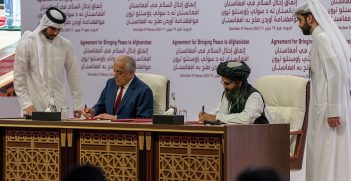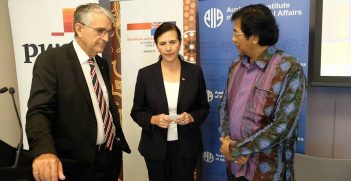Australia Should Back Calls to End Coal and Save its Drowning Neighbours

While all of us of will experience the effects of climate change most are not facing the inevitable disappearance of our country. Yet that is the case for the 92,000 inhabitants of Kiribati, as well as other low-lying island states across the planet.
With its nation dispersed over more than 20 islands, some increasingly subject to ocean flooding, the Kiribati government has purchased land in Fiji to relocate some of its inhabitants. Over the coming century Kiribati, along with every other maritime region, faces rising seas driven by oceans expanding as they warm, and by melting ice sheets and glaciers.
Ahead of the Paris climate conference, which begins on November 30, Kiribati’s president Anote Tong has issued a call for a moratorium on new coal mines. On his recent visit to Melbourne I spoke to President Tong about the prospects for Kiribati in a warming world, and efforts to mitigate the worst impacts.
End coal to save drowning islands
President Tong related that his call for a coalmine moratorium has had a sympathetic hearing from US President Barack Obama. He and former Australian Prime Minister Tony Abbott talked amiably but (at best) agreed to disagree. As yet, he has been unable to meet with Abbott’s successor Malcolm Turnbull.
What impressed me particularly is that, just as indigenous Australians relate to the land, President Tong was deeply passionate that the islands of Kiribati are the ancient, ancestral home of his people.
President Tong however is under no illusion that anything will happen quickly when it comes to weaning the world off coal. He points out that coal-fired power stations will be needed in the medium-to-long term to heat the colder northern countries.
Finding a coal alternative
There are several hurdles to cross in the transition away from fossil fuels. While 100% renewable energy may be possible, nuclear fission reactors may be needed as part any low carbon, coal free future for Europe, at least in the medium term. Nuclear generation has long dominated the power sector in France. Germany has made enormous efforts with renewables but they are (following the Fukushima disaster) using more coal as a consequence of phasing out nuclear, a move many climate scientists consider to be irresponsible.
China and South Korea are aggressively expanding their capacity for nuclear power generation, though China is also continuing to build coal plants.
Still, some nation states are determined to kick the coal habit as soon as possible. The UK has committed to closing its remaining coal fired plants by 2025 and will, instead look to nuclear, natural gas and renewables. The UK has long used some nuclear power, and there have also been innovative moves towards renewables and the use of domestic waste for the local co-generation of heat and electricity. And, as is the case for us in Australia, their coal-fired plants are old and in need of replacement.
When it comes to renewables, Australia has the advantage of being a massive solar and wind collector, with 23 million electricity–hungry humans versus 63 million in the UK. We have plenty of coal seam gas, although the concern here is that the leakage of methane (CH₄) from poorly-maintained wellheads negates its 50% (in CO₂ emissions) advantage over coal. However piped gas is much more efficient for local, small scale “trigeneration”.
Are we willing (or do we need) to open out the nuclear discussion here? It would be great to see a national debate on energy generation with everything on the table. Hopefully, the national dialogue may improve somewhat when the dust settles following the next federal election.
Coal might to some extent be saved by carbon capture and storage (CCS) but, even if the local geology is right, this is only likely to happen if an appropriate price is placed on carbon emissions. A direct carbon tax may work better than cap and trade schemes though, for political reasons, the latter (or some variation) may now be the only possibility in Australia. And, if there is a realistic versus a token carbon price, how does the economics of CCS rate against renewables and storage?
Accepting responsibility
Talking with President Tong, he had no illusions concerning either the morality of national governments or their independence when it comes to legislating against the perceived self-interest of extraordinarily wealthy, and often globalised, vested interests, particularly fossil fuel companies.
But, as Australian citizens have the enormous privilege of being able to debate and to vote in an open and democratic nation state, shouldn’t we be addressing the issue of possible consequences of our energy consumption and fossil-fuel export economy?
Apart from the possibility of taking the wrong direction and focusing on what will inevitably be stranded assets, what will the liability situation be for the mining companies, the coal exporting nations and their leaders and citizens if the consequences of global warming are as dire as predicted?
BHP Billiton is facing ongoing costs over the collapse of its local joint-owned tailings dam in Brazil. Global warming threatens unprecedented damage on a global scale, including the loss of small, vulnerable countries such as Kiribati. How should we account for the responsibility of rich nations such as Australia? Perhaps we will see accountability similar to the reparations exacted from Germany after the First World War, or even more severe costs.
The concept “think globally, act locally” has been attributed (in 1972) to New York microbiologist René Dubos. That accurately describes the reality of actions that might limit the impact of global warming. One thing we can do locally is vote.
Australia is a basically decent country. Few Australians would surely wish to see themselves as acting against the best interests of future generations. But we are known by our actions. We need a broad and informed debate on what we can do to limit global warming and, in the process, ensure our own longterm well-being. Can we seize the future with all its possibilities, or must we be locked into an ultimately unsustainable pattern of repeating the past?
Peter C. Doherty AC is a Laureate Professor at The Peter Doherty Institute for Infection and Immunity and a Nobel laureate for his work on how the immune system recognises virus-infected cells. This article was originally published in The Conversation on 24 November 2015. It is republished with permission.





